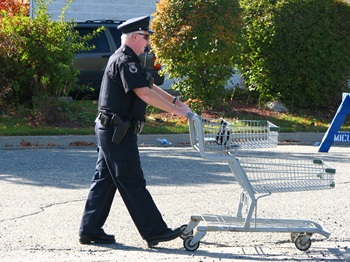By: Chad Ross, Manager, Industry Relations and Total Store Collaboration, FMI<br />
<br />
<p><img src="https://www.fmi.org/images/default-source/food-safety-security/3976368999_2e315f8795_b.tmb-large-350-.jpg?sfvrsn=9d81debb_1" data-displaymode="Thumbnail" alt="Police" title="Police" style="float: right; margin: 10px;" />Nowadays, the same old story keeps cropping in the news. It goes something like this: Dozens of people enter a store in unison and take as much product as they can as quickly as they can, and then as fast as their crime began, it’s over – as the offenders escape to waiting cars. Within today’s changing retail landscape, organized retail crime has evolved, becoming more brazen, more sophisticated, and as evidenced by the recent spate of smash-and-grab incidents, more violent.</p>
<p>Unfortunately, changes in law enforcement policy over the past two years have enabled greater criminal activity, augmenting shrink in many stores across the country. In some cases, local police departments have been so overwhelmed with other urgencies that they could not respond to food retailer distress calls. Disparities in state criminal law and law enforcement thresholds have made it more difficult for police to prosecute theft and robberies, and this is something known not only by retailers but by offenders, as well. Whether or not your retail company has fallen victim to theft or property damage in the past, it is critical that it be prepared in the event such crimes do occur.</p>
<p>What can retailers do to protect their customers, employees, and profits from this growing phenomenon? Find out at the 2022 Asset Protection and Grocery Resilience Conference, where Steve Hoptay (former Vice President of Asset Protection for Wakefern Food Corp) will host a session with Lieutenant Jim Ostojic (Lieutenant Polk County Police Department) to discuss the latest trends in organized retail crime. Join other retailers in a post-session peer-to-peer discussion as they examine new approaches, tools and tactics for addressing the retail crime concern, and how retailers can get more involved through private-public partnership. </p>
<p><strong>Do you have a Rising Star?</strong></p>
<p>The FMI Asset Protection & Grocery Resilience Rising Stars Program aims to recognize professional excellence in the field of asset protection among up-and-coming mid-career professionals.<br />
<br />
Finalists and the program winner will receive recognition at the 2022 Asset Protection and Grocery Resilience Conference, as well ason the fmi.org website. These exceptional professionals will also receive complimentary registration to the conference. Travel and accommodation costs will be at the expense of the honoree. No cash substitutions will be permitted.</p>
<p> <a href="https://www.lphall.com/lp-rising-star-fmi-rising-star" class="button">Learn More About Rising Stars</a></p>
By: Chad Ross, Manager, Industry Relations and Total Store Collaboration, FMI<br />
<br />
<p><img src="https://www.fmi.org/images/default-source/food-safety-security/3976368999_2e315f8795_b.tmb-large-350-.jpg?sfvrsn=9d81debb_1" data-displaymode="Thumbnail" alt="Police" title="Police" style="float: right; margin: 10px;" />Nowadays, the same old story keeps cropping in the news. It goes something like this: Dozens of people enter a store in unison and take as much product as they can as quickly as they can, and then as fast as their crime began, it’s over – as the offenders escape to waiting cars. Within today’s changing retail landscape, organized retail crime has evolved, becoming more brazen, more sophisticated, and as evidenced by the recent spate of smash-and-grab incidents, more violent.</p>
<p>Unfortunately, changes in law enforcement policy over the past two years have enabled greater criminal activity, augmenting shrink in many stores across the country. In some cases, local police departments have been so overwhelmed with other urgencies that they could not respond to food retailer distress calls. Disparities in state criminal law and law enforcement thresholds have made it more difficult for police to prosecute theft and robberies, and this is something known not only by retailers but by offenders, as well. Whether or not your retail company has fallen victim to theft or property damage in the past, it is critical that it be prepared in the event such crimes do occur.</p>
<p>What can retailers do to protect their customers, employees, and profits from this growing phenomenon? Find out at the 2022 Asset Protection and Grocery Resilience Conference, where Steve Hoptay (former Vice President of Asset Protection for Wakefern Food Corp) will host a session with Lieutenant Jim Ostojic (Lieutenant Polk County Police Department) to discuss the latest trends in organized retail crime. Join other retailers in a post-session peer-to-peer discussion as they examine new approaches, tools and tactics for addressing the retail crime concern, and how retailers can get more involved through private-public partnership. </p>
<p><strong>Do you have a Rising Star?</strong></p>
<p>The FMI Asset Protection & Grocery Resilience Rising Stars Program aims to recognize professional excellence in the field of asset protection among up-and-coming mid-career professionals.<br />
<br />
Finalists and the program winner will receive recognition at the 2022 Asset Protection and Grocery Resilience Conference, as well ason the fmi.org website. These exceptional professionals will also receive complimentary registration to the conference. Travel and accommodation costs will be at the expense of the honoree. No cash substitutions will be permitted.</p>
<p> <a href="https://www.lphall.com/lp-rising-star-fmi-rising-star" class="button">Learn More About Rising Stars</a></p>





